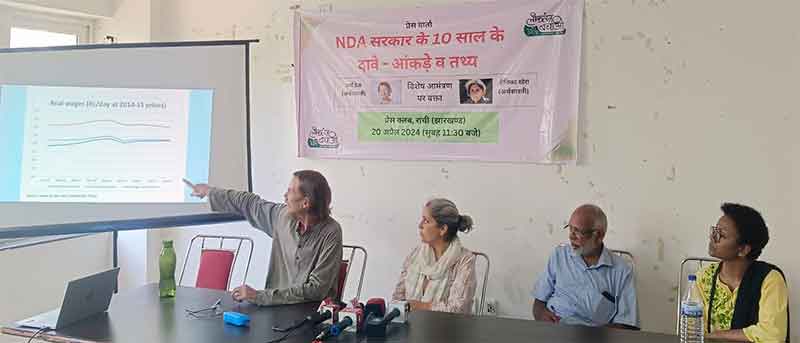
Gujarat Government’s decision to incorporate Bhagavad Gita as a compulsory text for the students of class VI to XII have already brought up several arguments. On one hand, a few scholars are of the opinion that it is nothing but a step toward fulfilling the dreams of Hindu Rashtra, on the other a few have rightly pointed out the ‘obscurantist themes and ideas’ of the text. However, one must contemplate the discursive context in which the decision to bring the ancient text into school books has been taken. For a blank eye it is just another harmless religious text- compulsory reading of which though is intimidating for other religions violating the very essence of constitutional morality, it doesn’t have far-fetching consequences. A meticulous reading of the text and its themes, nevertheless speaks otherwise.
The moral compass of Bhagavad Gita is entangled with majorly three notions- Dharma (Understood through its universal truth value), Nishfal Karma (The idea of work without expecting any result) and Absolute Submission to the Lord and Granting of Mokhshya. If we place these discourses in the current discursive context, the evolved meanings are not only frightening, rather is harmful for the posterity.
Dharma and its Implications:
While making a remorseful Arjuna understand that the truth lies in the side of Dharma, Lord Krishna connects it with the duties that people have to follow. The fountainhead of Dharma is Lord Krishna himself. Every sin absolves in him and every truth lies in him (Ch. 14; V. 27). In this monologue, the independent conscience of human being is not given any space. The idea of good life, from Platonic age to recent philosophical enquiries, has no value at all as the duties are predetermined. What a Man (Never a Woman/Queer/Non-Binary Genders) has to do is to just follow His path without invoking any critical or nuanced imagination.
To understand the concept of Dharma, however, the realization of the context is important. It was the moment when Arjuna seeing his brothers and relatives in the enemy sides got back his conscience- it was the moment he started think rationally. He realized there is nothing called a ‘just war’ given the probable deaths and destructions- and rightly at this point Lord Krishna intervened. He made him defy his calls of conscience. Placing the War on the moral high ground he declared it a ‘Dharma Yudha’. Dharma certainly here lies in the will of the Supreme, not in the human senses of empathy and love.
This script is someway or other very mundane to us. The justification of war on the moral high ground has been known practice. Whether it be American invasion of Afghanistan and Iraq or be the ongoing attack of Russia on the sovereignty of Ukraine, War has always upheld moral justifications. Closer to the home, four decades back in a winter morning, a few people justified destruction of a religious structure through the same discourse of following ‘Dharma’. Righting an imaginary wrong when becomes the duty of the people, Dharma becomes the moral compass. Against the grains of morally bankrupt Dharma, lies the human values, compassion, empathy and friendship where duty is a matter of quotidian engagement- not some implications of supreme dictates.
Nishfal Karma- Denying Responsibilities of Action
The idea of Nishfal Karma comes from one of the most popular slokas of Bhagavad Gita where Lord Krishna unencumbers Arjuna from the bearings of good and evil pointing out – ‘Karmanye vadhikaraste Ma Phaleshu Kadachana’ (Ch.2; V. 47) i.e. one doesn’t bear the fruit of his actions. While showing Arjuna through Viswarupa Darshan (Coming out of Lord Krishna as the ultimate creator and destroyer) that the whole world has already been destroyed and he was playing just a small role in the vast schema of things, Lord Krishna made him realize that nothing is in his control and he must have to follow the duties or more precisely the Dharma.
Such denial of accountability makes people free from their responsibility of any action. This idea if embedded among the future generations, not once we would listen to the stories of remorse that blot our violent past. Repentance and remorse are what make us more human. It may not lessen the weight of our offences but it can at least let us die with the faith in human conscience intact. Saddat Hussain Manto’s short story ‘Thanda Ghost’ becomes extraordinary portrayal of partition not only for its final sequence in death, rather for the protagonist’s silence after violating a dead body. It was his remorse that remained unexpressed, still felt.
The stories of rioters becoming social workers and flag bearers of communal harmony are profuse in numbers. Denial of both the fruits of actions and accountability directly stand against such essence of remorse and repentance. Had there been no remorse, perhaps there wouldn’t have been any Valmiki (The author of Ramayana whose dacoit persona precedes his sage title). In our current political context where mob lynching is a spectacular saga celebrated through Whatsapp forwards- remorse is the most desired value. To make our future generations read that the duties lie in The Master’s Voice (read Choice) and the action doesn’t bear any fruit is pushing him toward being less accountable. It ultimately leads to a Sisyphean myth where rolling stone neither changes the temporal, nor the spatial.
Mokhshya & The calls for Absolute Submission:
Dr. B. R. Ambedkar while speaking on democracy referred to J S Mill and said that the sustenance of democracy depends on not laying ‘liberties at the feet of even a great man, or to trust him with powers which enable him to subvert their institutions’. These words of wisdom though have been repeated several times across texts and media, I am really suspicious of how our next generation would find it relevant. While studying Bhagavad Gita whatever one realizes or not, one thing becomes clear- that there is a supreme power who not only has created and destroyed the Universe and making us play the roles, rather He is the absolute power to whom if we submit, we will get Mokhshya. The idea of Mokhshya in Hinduism is not similar to that of Buddhism. In Hinduism, it means absolute salvation through submission to the supreme Lord- here Lord Krishna.
In Chapter 9 Verses 30-31, Lord Krishna says- ‘Even if a man has grossly misbehaved, if he worships Me and is devoted to Me exclusively, he is certainly to be considered a sadhu [good person], for he has actually come to a perfect determination. Quickly he becomes a righteous soul [dharma-atma] and attains to lasting peace. O son of Kunti, proclaim that My devotee is never lost!’. These repeated explications of supremacy are accompanied with the revelation of his Messianic persona. In Chapter 4 Verses 7-8, He proclaims,
Yada-yada hi dharmasya
Glanir bhavati bharata
Abhyutthanam adharmasya
Tadatmanam srjamy aham…
Paritranaya sadhunam
Vinasaya ca duskritam
Dharma-samsthapanarthaya
Sambhavami yuge-yuge…
(Whenever there is crisis of Dharma, whenever there is emergence of Adharma, I create myself. To relief the Sadhus from Asadhus, to destroy the miscreants and to restore Dharma, I come in every Yug).
These slokas further refer to the Messianic appearance of Lord Krishna as the saviour. He is precisely the Man who saved Draupadi from being disrobed- He is the man who is omnipotent and in whose hands everything is safe.
Contextually, this idea of a supreme saviour is notably common to us. The saviour saves Muslim women from the Muslim men- He disrobes women to proffer them liberty and calls for a war without remorse and repentance.
At a time when the ‘imagined other’ has successfully been constructed and call of a just war with a high moral ground has been whistled, the last thing that we need is a lesson with the values of submission, remorseless action and conscienceless truth. To place the teachings of Bhagavad Gita and its moral compass in line with the current political discourses make it clear what Hindutva forces are looking for- submissive soldiers ready to lay their liberty at the feet of a great man to achieve Mokhsya though Nishfal Karma. And, unfortunately this is exactly what against which the founding parents of our Nation offered us the Constitution.
Abhik Bhattacharya is a Doctoral Research Fellow, School of Liberal Studies, Ambedkar University Delhi










































